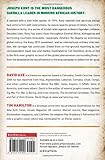Editor's Preface
In late 2010, journalist David Axe traveled to Democratic Republic of Congo to report on the devastation being wrought there by the Lord’s Resistance Army, a Ugandan rebel group led by Joseph Kony. Originally organized in opposition to the government of Yoweri Museveni, the LRA’s activities later spread beyond Uganda and into Sudan, Central African Republic, and the DRC. The group, which many argue has devolved into teams of religiously-inspired bandits, is credited with widespread human rights violations throughout Central Africa. “I hoped to bring some attention to the LRA’s crimes,” Axe told me recently. “Of course, my own efforts ended up overshadowed by Invisible Children and the #Kony2012 campaign.”
In the wake of Invisible Children’s public awareness campaign and the controversy it engendered comes Army of God: Joseph Kony's War in Central Africa, a graphic novel based on Axe’s reporting in which he chronicles the LRA’s depravity from a variety of angles. Axe tells the stories of Congolese victimized by Kony’s group, reports on the uneven performance of UN peacekeepers in the country, details the international response to the LRA, and catches readers up on developments since the Invisible Children fiasco and the deployment of American military personnel to the region.
Axe is no stranger to comics as a medium for war reporting. “I've been doing nonfiction war comics since 2006,” Axe said, “right after my first trip to Iraq. I've covered several wars in comics forms so it seemed natural to me to address the LRA the same way. Plus, Congo as a setting lends itself to comics treatment: the lush landscape, the suffering, the despair—these are all ‘big’ elements that can be recreated in broad ink strokes.”
Inspired by the work of Joe Sacco and Ted Rall, Axe finds advantage in the graphic novel as a vehicle for political reporting. “Comics blend art and words in a way that other art forms don't. You can portray a complex idea in a single broad image and add fact and detail in your prose. Where print reporting moves in a single line across the page, comics reporting begins with an overall impression then invites the reader to rove the page, weighing detail. Print is a guided tour. Comics is freeplay.”
Unlike Sacco and Rall, however, Axe isn’t an illustrator. For Army of God, he teamed up with Tim Hamilton, whose striking black and white drawings anchor the narrative and give it shape. “More than any other artist working,” says Axe, “Tim can modulate between naturalism and abstract art, meaning he can get the journalistic detail right, when needed, and pull back from the violence, where necessary.”
As for the book’s episodic organization, which highlights the various actors directly and indirectly involved in efforts to capture Kony and bring an end to the LRA, Axe says he “wanted as broad a tableau as possible, in order to capture the sheer breadth and complexity of the LRA war. The episodic format recreates the process of reporting the war. I moved across the DRC, reporting related stories and building interlocking sources as I went. The comic works the same way.” From there, “I wrote the script and sent it to Tim along with photo references. He did his own research to add depth and detail.”
What follows below is a selection from the book which tells the story of Fidel Mboligikpele, “a schoolteacher in Duru when the LRA attacked in 2008 [who] lost almost his entire class to the rebels.” Mboligikpele currently lives in a refugee camp in Dungu where he continues to teach. - by Michael Busch
David Axe is a freelance reporter based in Columbia, South Carolina. Since 2005 he has reported from Iraq, Afghanistan, Lebanon, Somalia, Chad, Congo and other conflict zones, for Wired, the BBC, Salon, Esquire, C-SPAN, Voice of America and many others. David is the author of several graphic novels, including War Fix, War is Boring, and The Accidental Candidate: The Rise and Fall of Alvin Greene.
Tim Hamilton is a Brooklyn artist who has produced illustrations for the New York Times, Cicada Magazine, DC Comics, Marvel Comics, Mad magazine, Nickelodeon magazine and Lifetime. He adapted Ray Bradbury's Fahrenheit 451 into a graphic novel, which was nominated for an Eisner award.
Michael Busch is Opinions Editor for Warscapes.


